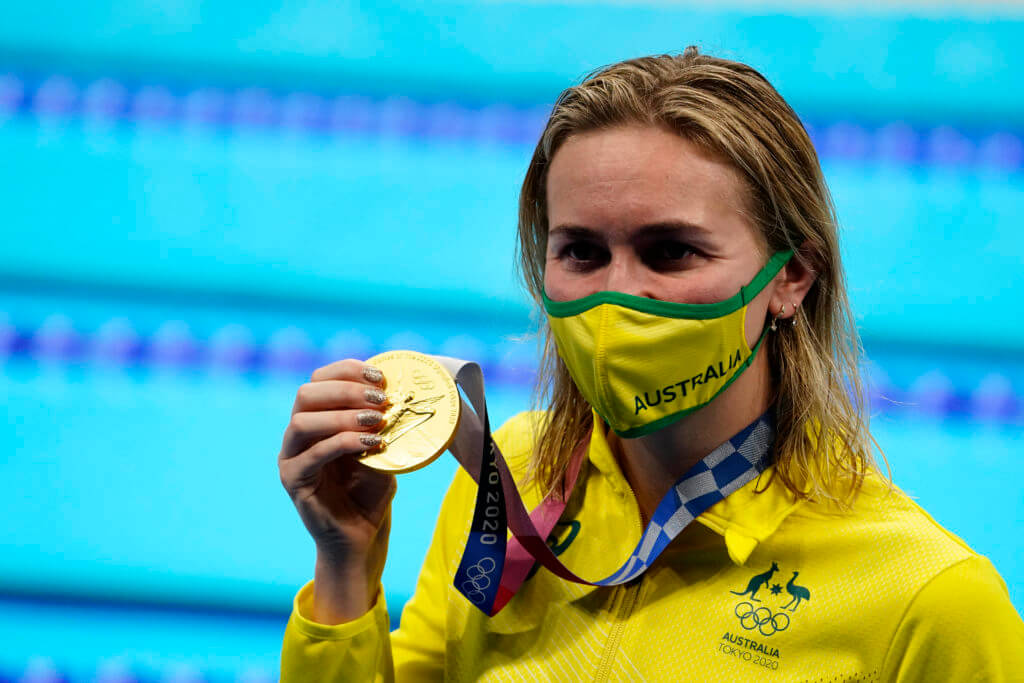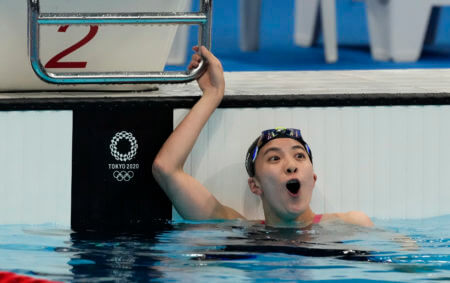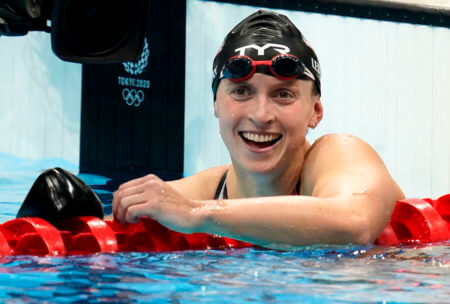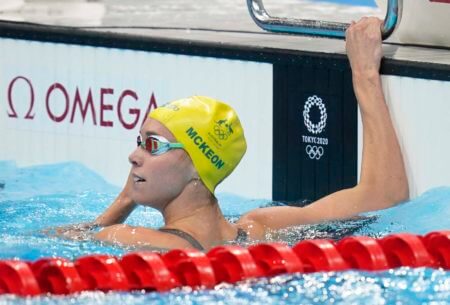Olympics: Who is the Female Swimmer of the Games?

Editorial content for the 2021 Tokyo Olympic Games coverage is sponsored by GMX7.
See full event coverage. Follow GMX7 on Instagram at @GMX7training #gmx7

Olympics: Who is the Female Swimmer of the Games?
There would be little argument if we declared that the best male swimmer in the world and the best male swimmer of the Olympics is Caeleb Dressel, who already has three gold medals in his pocket following wins in the 400 freestyle relay, 100 freestyle and 100 butterfly. The last of those came in world-record time. Dressel has two more finals on his agenda for Sunday morning, the 50 freestyle and 400 medley relay. The only other swimmer with two individual gold medals so far is Evgeny Rylov.
For the women’s meet, there has been no shortage of stars competing in Tokyo, with four swimmers having already captured multiple gold medals: Australia’s Ariarne Titmus in the 400 free and 200 free, Japan’s Yui Ohashi in the 400 IM and 200 IM, Australia’s Kaylee McKeown in the 100 back and 200 back and the United States’ Katie Ledecky in the 1500 free and 800 free. A third Australian, Emma McKeon, joined the list on the final night of the Olympics when she took gold in the 50 free after previously topping the 100 free.
On top of that, 200 breaststroke gold medalist Tatjana Schoenmaker set an Olympic record (that still stands) in the 100 breast prelims before finishing 0.27 behind American Lydia Jacoby in the final, and 200 butterfly gold medalist Zhang Yufei touched second in the 100 fly final, just 0.05 behind Maggie MacNeil. So there were very nearly all double winners in the women’s individual events in Tokyo.
So of the five swimmers who have won double golds, which swimmer’s efforts in Tokyo have been most impressive? If there is to be a sole winner of the title “swimmer of the meet,” who should it be? To break the tie between the multiple golds, we’re going to consider additional medals, quality of races and where times rank all-time.
The Case for Titmus
Titmus won the consensus best head-to-head matchup of the Games when she overtook Ledecky in the 400 free final. Titmus swam the second-fastest time in history and had to fend off the fourth-fastest time in history – Ledecky’s second-best effort of her legendary career – to earn gold. In winning her second gold, Titmus held off another inspired effort, this time from Siobhan Haughey, and she broke Allison Schmitt’s nine-year-old Olympic record.
Titmus also mounted a serious challenge to Ledecky in the 800 free final, and although she touched the wall 1.26 adrift in second place, she moved up to become the second-fastest performer ever in the event. And she led off Australia to a bronze medal in the 800 freestyle relay.
The Case for Ohashi

Yui Ohashi after winning gold in the women’s 200 IM at the Olympics — Photo Courtesy: Rob Schumacher/USA Today Sports
Ohashi only swam two events in Tokyo, but gold medalist in both the 200 and 400 IM is the world’s most versatile swimmer. She pulled away from the field in the most grueling event in the pool, the 400-meter medley, and then she battled to the wall to edge out American Alex Walsh in the 200 IM. Admittedly, Ohashi did benefit from the slowest winning times in years at a major championships (largely due to Katinka Hosszu’s steep decline), as well as McKeown’s last-minute decision to scratch the 200 IM, but she won those races and deserves her props here.
The Case for McKeown
McKeown was the backstroke star of the Tokyo Games, claiming gold in the 100 and 200-meter events and leading off Australia’s mixed medley relay that earned bronze. She will also go first on the Australian women’s medley relay, giving her a very strong possibility of another medal.
Not that it mattered in the push for medals, but McKeown has not been quite at her record-setting best in Tokyo. She was barely off her world record in the 100 back and then a half-second off her times from earlier this year in the 200 back. Her times were around the same as she had been swimming most of the year, but that’s because McKeown made swimming fast on a monthly basis the norm. She also did not swim the 200 IM, which would have given her another medal shot.
The Case for Ledecky

Katie Ledecky — Photo Courtesy: Grace Hollars/USA Today Sports
This Olympics did not have the shock-the-world quality of Ledecky’s first Games in London or the awe and majesty of her basically-perfect second Games in Rio. This time, Ledecky was not at her best every time out. Her gold-medal winning swims, in the 1500 free Wednesday and the 800 free Saturday, were not special performances by her mighty standards. On the other hand, her effort in the 400 free final was just sensational as she fought tough against Titmus on her way to her best swim in five years. Her anchor leg of the women’s 800 free relay was magical as she went by pre-race favorite Australia and nearly caught gold medalist China.
No, Ledecky was not perfect. But boy, she showed her greatness. Gutting out one of her best-ever 400-meter swims to keep pace with the challenger to her throne. Finishing fifth in an Olympic final and then coming back to crush the field in a 1500-meter race – the first of its kind at the Olympic level – an hour later. Coming back the next night to record the fastest split in a relay and will the Americans to silver. And of course, showing graciousness and class at every stop along the way.
The Case for McKeon
Without question, McKeon is the MVP of these Olympics. She has won seven medals, including four gold medals, and she has completely emerged from the shadow of previous Australian sprinting greats like Cate Campbell by taking gold with the second-fastest time in history in the 100 freestyle, 51.96. She won her second individual gold in the 50 freestyle during the final session of swimming at the Games, and her 23.81 improved her to fifth all-time in the event.
McKeon has been Australia’s go-to in each relay, and she is the first swimmer in Olympic history to win four relay medals in one Olympics. Of course, this is the first Games with the mixed medley relay included, but no one else in Tokyo won four. And McKeon’s seven medals at these Olympics broke the record for the most-ever medals by a female swimmer in one Olympics. Previously, Kristen Otto won six in 1988 and Natalie Coughlin (2008) matched that mark in 2008. Again, McKeon certainly benefitted from the addition of the mixed medley, but she swam the events on the program and took care of business.
The Verdict

Without a doubt, Emma McKeon has been the most valuable swimmer at the Olympics — Photo Courtesy: Grace Hollars/USA Today Sports
That’s a lot of really impressive candidates from which to choose, and you could read these five cases and decide upon any of them. Even Schoenmaker, the only female swimmer to break an individual world record in Tokyo, has a great case for inclusion here.
But if we’re going to pick one right now, the nod will go to Titmus – barely. McKeon is the most valuable swimmer this week, without question, because of her role on Australia’s relays and her status as the all-day-every-day go-to. She anchored the mixed medley relay Saturday morning in 51.76 despite literally walking straight from the pool after her 50 free semifinal to the ready room. No warmdown at all. She pulled another double Sunday and ended up claiming two golds in one session.
So why Titmus? Because she came in first place in the meet’s best race, her 3:56.69 in the 400 free so close to one of the most impressive world records on the books. She came close to repeating her near-world record in the 200 free from last month, and she pushed Rebecca Adlington aside as the second-fastest swimmer ever in the 800 free after Adlington was in that spot behind Ledecky for eight years.
At the end of a marvelous week of racing, Titmus marginally outshines her fellow champions.




